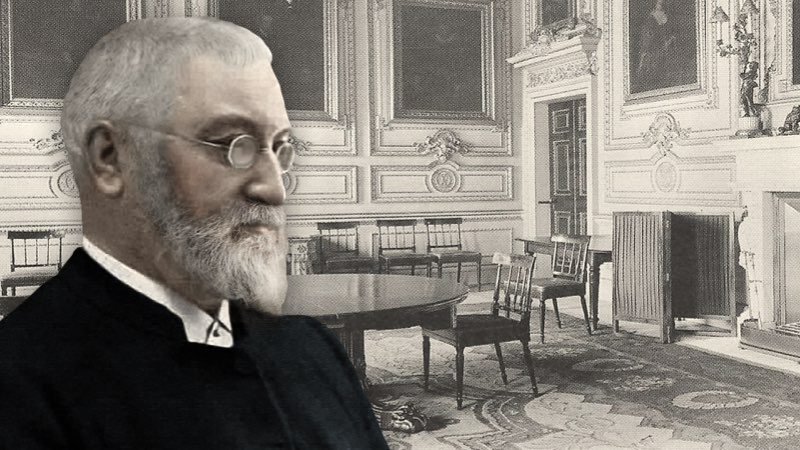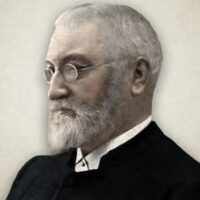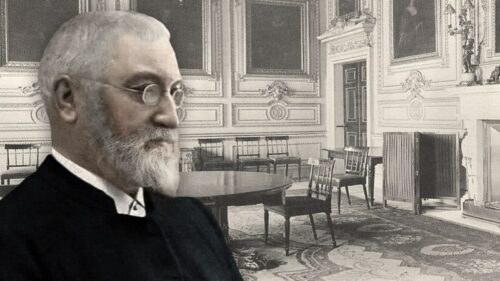
The Life And Ministry Of E. W. Bullinger
Earthen Vessel 1913:
The Rev. E. W. Bullinger, D. D.
A Testimony And An Appreciation
By Alfred G. Secrett
It is with unfeigned sorrow that we announce the death on June 6th, after a short illness, of the Rev. E. W. Bullinger. God has taken from among us a faithful witness for the truth, and lovers of the doctrines of sovereign grace are mourning the loss of a great teacher and a beloved brother in the Lord.
The honoured secretary of the Trinitarian Bible Society was well known to most of our readers, for it was through his efforts that doors were opened for the Society in the Particular Baptist communities throughout the country.
Dr. Bullinger was, by common consent, one of the most learned men of his day in the ancient languages of the East—the tongues in which the Bible was first written. His Greek Lexicon established the reputation of its author as a scholar of the highest order, and his contributions to general theological literature are invaluable both to the student in divinity and to the ordinary reader of the Word of God. But his knowledge was by no means confined to philology and theology. A scientist of no small ability, he delighted to find in the study of the work of the Creator of the universe traces everywhere of the same God who inspired holy men of old to write the Scriptures of truth; for the same phenomena were discovered by the great student in his minute researches into Holy Writ which also appear in the tabulated results of the investigations of the astronomer, the analyst, the botanist, and the student of harmony. It was thus proved that the very literary structure of the Bible could only be the work of the same Infinite Being who fixed nature’s laws and Who upholds all things by the word of His power.
Thus, while increasing numbers of scholars and theologians were using their influence in vainly seeking to overthrow the Word of God which shall stand for ever, and in providing the man in the street with a reason for the unfaith that is in him, Dr. Bullinger, fired with devotion to the cause of truth, contended earnestly with tongue and pen, through evil and through good report, for the faith once delivered to the saints.
In the essentials of belief and worship Dr. Bullinger was one with us who are generally called Calvinists. He rejoiced in the doctrines of grace as set forth in the creeds of our Particular Baptist Churches, and bore eloquent and powerful testimony to divine sovereignty, as manifested in God’s Word and works and in his own experience. He was a renowned enemy of Popery and Arminianism—those closely allied systems against which we also earnestly contend; and against modern sensational methods employed in Christian work he waged incessant war. Men and women, with all this in common, fighting on the same side in such a warfare, moved with the same ideals, and loyal to the same Captain of Salvation, can afford to agree in differing in non-essential matters. And if in some side-issues we have been unable to see exactly eye to eye with the brother who has been taken from our midst, and if we could not accept his interpretation of every passage of the Book we all loved, we could still walk together, “endeavouring to keep the unity of the Spirit,” using reverently and thankfully God’s good gifts—apostles, prophets, evangelists, pastors and teachers—‘’till we all come into the unity of the faith.”
Unlike many other intellectual giants, Dr. Bullinger in controversy was always courteous and kindly. In contending against the enemies of the faith he attacked their false doctrine only, and never descended to vituperation of its exponents. His occasional controversies with his brethren in the Lord were never marred on his side by cruel personalities, extreme statements, and hard words, such as have disfigured the writings of certain honoured divines of a former generation, whose souls should have been knit together in love. Those who knew him personally can testify that he was humble in heart, unassuming in manner, and kindly and simple in character. The children of the house which he visited were always glad to see him, for he loved little children. I have seen them gather round him, to find the great Doctor of Divinity a delightful entertainer. To know him was to love him, and his loss will be mourned by the household of faith throughout the whole world.
And now that God has laid His faithful servant to rest, we turn again to those words of encouragement and promise spoken to Joshua: “Moses My servant is dead; now therefore arise, go over this Jordan, thou, and all this people…As I was with Moses, so will I be with thee: I will not fail thee, nor forsake thee.” God took away one servant and raised up another to carry on His work. We have now to look to the same faithful God, that He will give all needed grace and wisdom and strength to those on whose shoulders Dr. Bullinger’s work must fall. The witness of the Trinitarian Bible Society will, we are assured, be maintained. This witness is as necessary now as ever it was, for the older Bible Society still persists in its evil policy of circulating, as faithful translations, versions of the Bible which have been deliberately corrupted to teach the doctrines of Rome and to confirm the devout Romanist in his errors. We rejoice that the Particular Baptists, always intelligently and consistently Protestant, have loyally responded to the appeal of the Trinitarian Bible Society and strengthened the hands of its committee by their unswerving support.
Our noblest tribute to the memory of our departed friend will be to work with redoubled energy for the Institution which he loved, to seek to extend its operations, and to make it more widely known among those who believe in the Bible as the everlasting word of the living God.
Ethelbert Bullinger (1837-1913) was a Calvinist clergyman in the Church of England. He served as parish curate in Tittleshall, Norfolk (1863–1866); Notting Hill, London (1866–1869); Leytonstone, London (1869–1870); Walthamstow, London (1870-1874); St. Stephen's (1874-1888). He was a descendent of the Swiss Reformer Heinrich Bullinger. At the age of 29, he was appointed clerical secretary of the Trinitarian Bible Society, a position he held until his death in 1913. Although he was a prolific writer, many of his works deserving a place in every gospel minister’s library, he nurtured a number of strange views (“ultradispensationalism”, Annihilationism, Gospel Constellationalism and Gospel Numerology). Nevertheless, he maintained firm views on sovereign grace and was a proponent of a young-earth-six-day-creation.




